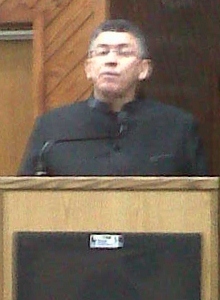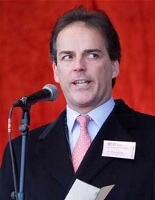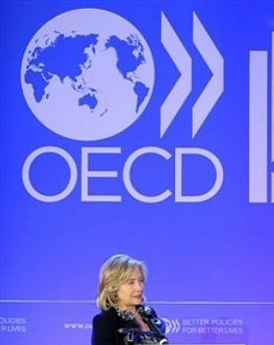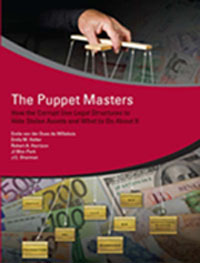 Finance
Finance

FSB finds Cayman Islands compliant
 (CNS Business): The Financial Stability Board has found that the Cayman Islands has “sufficiently strong” regulatory and supervisory standards when it comes to cooperation and information exchange on the global stage. In a new report the FSB said 41 countries were determined to be compliant or largely compliant with all, or all except one, of the relevant cooperation and information exchange standards. The premier, in his role as finance minister, said the conclusion regarding Cayman’s adherence to cooperation and information exchange standards “is robust affirmation that the jurisdiction is well respected, and a good place to conduct business.”
(CNS Business): The Financial Stability Board has found that the Cayman Islands has “sufficiently strong” regulatory and supervisory standards when it comes to cooperation and information exchange on the global stage. In a new report the FSB said 41 countries were determined to be compliant or largely compliant with all, or all except one, of the relevant cooperation and information exchange standards. The premier, in his role as finance minister, said the conclusion regarding Cayman’s adherence to cooperation and information exchange standards “is robust affirmation that the jurisdiction is well respected, and a good place to conduct business.”
“In terms of cooperation, the Islands are placed alongside the giant economies of the G7 and G20 countries,” McKeeva Bush said.

UK Tory MP backs tax havens
 (Daily Telegraph): A conservative MP has spoken out in defence of tax havens and against what he called "a one-sided debate that demonstrates a fundamental lack of understanding of their role in the global financial market". Mark Field sought to dismantle the arguments put forward by the likes of Nicholas Shaxson, author of Treasure Islands, an exposé of the secret world of offshore tax havens, and NGOs such as Action Aid, who often present the world's problems as solvable through the retrieval of money supposedly siphoned offshore. Field argued that UK corporate tax avoidance via international finance centres was lower than the £25 billion claimed and advised the UK government to think twice before imposing more regulation on these jurisdictions.
(Daily Telegraph): A conservative MP has spoken out in defence of tax havens and against what he called "a one-sided debate that demonstrates a fundamental lack of understanding of their role in the global financial market". Mark Field sought to dismantle the arguments put forward by the likes of Nicholas Shaxson, author of Treasure Islands, an exposé of the secret world of offshore tax havens, and NGOs such as Action Aid, who often present the world's problems as solvable through the retrieval of money supposedly siphoned offshore. Field argued that UK corporate tax avoidance via international finance centres was lower than the £25 billion claimed and advised the UK government to think twice before imposing more regulation on these jurisdictions.
The UK, in fact, had much to thank offshore finance jurisdictions for, particularly those with which it has a constitutional relation through its Crown Dependencies and Overseas Territories, said Field at the Sovereign Group seminar at the Caledonian Club last week. In a reference to the UK's participation in the current G20 summit, Mr Field said: "The UK has a constitutional relationship with half ofthe top 30 offshore finance centres.

UK and OTs remain top destinations for dirty money
 (EU Observer): EU Member states Cyprus and the UK have been named by the World Bank as two of the world's leading destinations for money launderers. The Washington-based body in a new report noted that out of 150 high-level corruption cases exposed in recent years, the UK and UK overseas territories Bermuda, the British Virgin Islands, the Cayman Islands, the Isle of Man and Jersey hosted 172 companies used in criminal schemes. "Corruption is estimated to be at least a $40 billion dollar a year business. Every day, funds destined for schools, healthcare, and infrastructure in the world's most fragile economies are siphoned off and stashed away in the world's financial centers and tax havens, the author of the study said.
(EU Observer): EU Member states Cyprus and the UK have been named by the World Bank as two of the world's leading destinations for money launderers. The Washington-based body in a new report noted that out of 150 high-level corruption cases exposed in recent years, the UK and UK overseas territories Bermuda, the British Virgin Islands, the Cayman Islands, the Isle of Man and Jersey hosted 172 companies used in criminal schemes. "Corruption is estimated to be at least a $40 billion dollar a year business. Every day, funds destined for schools, healthcare, and infrastructure in the world's most fragile economies are siphoned off and stashed away in the world's financial centers and tax havens, the author of the study said.
Premier’s office confirms trip to China
(CNS): The premier’s press office issued a release on Monday confirming that McKeeva Bush has led a delegation to China. The office said that the group had gone to the Far East to present the Cayman Islands business case “to top financial intermediaries and high net worth individuals” at a special conference there. It was described as a “private event” involving guest speakers and panellists from prominent private sector firms as part of the China Offshore Summit in Shanghai on the 26 and 27 October. As well as government officials the delegation included representatives from Ogier, Maples and Calder, Walkers Global, Ernst & Young, PricewaterouseCoopers , dms Management and others.
“They offered strong validation for the country’s leadership position in the financial services sector and explained why Cayman structures are so highly sought after,” the premier’s press office stated.
According to the release, the presentation was part of a conference organised “to educate investment advisors, venture capitalists, private equity firms and other financial institutions on the ways they can benefit from the unique asset management and corporate product offerings available in leading offshore financial centres,” and attracted over 500 delegates across both days.
The Cayman Islands’ function was, the premier’s office said, “the most subscribed segment of the private event” and included updates relating to Cayman’s General Registry and its ability to now register companies in a foreign script which was said to be well received. Cayman officials also dealt with inquiries regarding requirements for establishing what the premier has often termed “a physical presence” here in Cayman.
“It was noted that this type of investment decision was becomingly increasingly attractive as Chinese tax authorities are moving towards a regime that promotes more substance over form,” the release stated.
Bush was reportedly pleased with the positive response to the Cayman Islands’ presence at the conference.
“China’s aggressive growth rate has been nothing short of impressive,” the premier said. “Its foreign exchange reserves grew by over 2 trillion from 2006 to 2010, hitting the $3.2 trillion mark by the third quarter of 2011. This means its capital build up continues to surpass expectations.”
Although the exact numbers on the visit to Shanghai which has included other stops have not been revealed the premier justified his latest travels because of possible investment opportunities.
“We made this trip because the country represents such a compelling case of increased business potential it simply cannot be ignored,” he stated.
The overseas mission has also included a meeting with China Harbour Engineering Company Ltd, the company currently in talks to construct Cayman’s proposed cruise berthing facilities, to view its capabilities firsthand. The premier’s office stated that the delegation was also making preliminary investigations to determine the feasibility of establishing a Cayman office in mainland China.
“There has been mounting evidence to suggest that companies are bypassing Hong Kong and making a direct move into China and with Shanghai being the commercial capital, it was important to assess the possibilities while there,” the release stated.
The final leg of the trip will involve meetings with private sector firms in Hong Kong,the office added, to provide updates on current and pending changes to financial service legislation and to get feedback on what the jurisdiction can do to further support the industry and facilitate growth.
The premier’s office said that there was “resurging acknowledgement in business circles that evoking the personal touch when conducting business is vital to success despite the numerous advances in technology that have enhanced global communications,” as it sought to further justify the trip.
The premier’s office added that the presence made the jurisdiction “tangible” to investors and face-to-face contact “builds trust and familiarity” which were described as important to working relationships. Conference organisers and attendees said the premier's presence lent “substantial emphasis” to efforts to attract investment, the office indicated.
Other jurisdictions in attendance at the Shanghai offshore business conference included the Isle of Man, The Bahamas, Belize and the Cook Islands.

CIMA reports 12% increase in value of captives
 (CNS): According to the third quarter figures from the Cayman Islands Monetary Authority (CIMA) the local captive insurance sector continues to do well despite the soft global conditions in the insurance market in general. CIMA licensed 29 captive insurance companies in the first nine months of 2011, 14 more than during the same period in 2010. The total number of captives in the jurisdiction at 30 September 2011 stood at 730. Total premiums as at 30 September were reported at US$9.6 billion a 12 percent increase on December last year when premiums were valued at US$8.6 billion and the highest recorded in CIMA’s history.
(CNS): According to the third quarter figures from the Cayman Islands Monetary Authority (CIMA) the local captive insurance sector continues to do well despite the soft global conditions in the insurance market in general. CIMA licensed 29 captive insurance companies in the first nine months of 2011, 14 more than during the same period in 2010. The total number of captives in the jurisdiction at 30 September 2011 stood at 730. Total premiums as at 30 September were reported at US$9.6 billion a 12 percent increase on December last year when premiums were valued at US$8.6 billion and the highest recorded in CIMA’s history.
Total assets, as of 30 September this year were reported at US$58.3 billion, compared to US$57.9 billion as at 31 December 2010, the authority revealed.
CIMA’s Managing Director, Mrs. Cindy Scotland said the increase in captive formations and the size of the premiums indicated the health of local captive industry, despite the international market.
“In all of 2010 there were 25 new captives formed, so for our 2011 numbers to already be at 29, and with new applications pending, we anticipate this calendar year to reflect significant growth in new captives,” she added.
The total number of captives at 30 September is only one more than the 729 recorded at the same time last year and there are also eight less than the 738 active at the end of last year but the total number has still increased steadily throughout this year.
Officials explained the decrease was due to licence termination of companies in liquidation since 2009 and 2010 but not dissolved until 2011, and to special purpose vehicles completing their one-year policy cycle. So on 31 March there were 720 captives in Cayman which grew to 725 at 30 June, before reaching 730 last month.
A captive is an insurance company formed and owned by an entity or group of entities for the purpose of covering the risks of that entity or group. The Cayman Islands has continued as the leading jurisdiction for health care captives. As at September 2011, health care was the primary line of business for 256 companies (35%). Workers’ compensation remained the second largest line of business with 157 companies (22%) providing this as their primary type of risk insured.
The 730 class B (i.e., captive) licensees active as at 30 September comprise the following: 418 pure captives (57%), 120 segregated portfolio companies (16%), 75 group captives (10%), 51 association captives (7%), 34 special purpose vehicles (5%), 31 open market insurers (4%) and one rent-a-captive. The 120 segregated portfolio companies comprise a total of 634 active segregated portfolios.
The Cayman Islands captive insurance industry is composed mainly of companies insuring risks in North America. Premiums originating from North America accounted for 84% of the Cayman market, followed by Europe at 3%, Caribbean and Latin Americaat 2%, and the remaining global market at 11%.
In terms of captive numbers, North America accounts for 90% of the Cayman market, followed by Caribbean and Latin America at 3%, Europe at 2%, and the remaining global market is 5% the authority stated in a release Friday.

Goldman faces suit over sale of risky debt
(Reuters): Goldman Sachs Group Inc has been hit with a new $1.07 billion lawsuit for having allegedly sold risky debt that it expected would tumble in value to an Australian hedge fund, causing that fund to become insolvent. The lawsuit by the Basis Yield Alpha Fund alleges fraud, breach of contract and negligence, and seeks to recoup $67 million of losses plus $1 billion of punitive damages. It was filed on Thursday with a New York state court in Manhattan. Basis Yield was managed by Sydney-based Basis Capital Funds Management Ltd.
Basis Yield sued three months after a U.S. judge dismissed a similar case, saying the fund could not sue in federal court under U.S. securities laws because its investment in the Timberwolf 2007-1 collateralized debt obligation did not qualify as a "domestic" transaction.
Timberwolf was cited in a scathing U.S. Senate panel report in April that faulted Goldman, Deutsche Bank AG and others for hawking debt they expected to perform poorly.

Anti-tax groups ask Congress to stop paying OECD
 (CNS): A group of activists campaigning for lower taxes in the US have written to the American congress asking the, to cut the USD100m taxpayer subsidy paid to the Organization for Economic and Cooperation Development (OECD) because of what they claim is the agency's opposition to tax competition. In a letter released this week the Coalition for Tax Competition said they had “long been disturbed” about what they said was the OECD’s 'harmful tax competition' project that seeks to hinder the flow of jobs and capital to low-tax nations.
(CNS): A group of activists campaigning for lower taxes in the US have written to the American congress asking the, to cut the USD100m taxpayer subsidy paid to the Organization for Economic and Cooperation Development (OECD) because of what they claim is the agency's opposition to tax competition. In a letter released this week the Coalition for Tax Competition said they had “long been disturbed” about what they said was the OECD’s 'harmful tax competition' project that seeks to hinder the flow of jobs and capital to low-tax nations.
The authors of the letter which include representatives from Americans for Tax Reform, Americans for Prosperity, the Sovereign Society, the Center for Financial Privacy and Human Rights and the National Tax Limitation Committee, wrote that the United States is the world's biggest beneficiary of international capital flows and tax competition and described the contribution made by the AUS government from the public funds to the OECD as “the height of folly.”
Signed by 16 people from various think tanks and taxpayer organizations the letter also criticises the OECD for its trend in supporting certain domestic policies such as 'stimulus' spending, cap-and-trade regulation, and a value-added tax in the US, which the authors say means the US taxpayers are subsidizing further advocacy for bigger government and higher taxes which they claim are against their own interests.
“US taxpayers should not be funding an organization which works against their interests by promoting 'a statist agenda,” the letter states.
Andrew Quinlan, President of the Center for Freedom and Prosperity and Coordinator for the Coalition for Tax Competition argued that OECD bureaucrats have lived a fat and happy life using the US taxpayer dime. Meanwhile, Dan Mitchell from the Cato Institute said that the OECD is “in love with higher taxes,” and called for the US government to stop sending US taxpayer dollars to the Paris and keep it at home.
See letter here

World bank blasts abuse of company registration
 (The Economist) : A new report by the World Bank called “The Puppet Masters” has investigated some 150 cases of what it calls “grand corruption”, with a total of $50 billion in illicit assets. Nearly all involved use of companies in which the real ownership was concealed, and of bank accounts, often in respectable countries . The United States is “by far the worst performer” of the countries reviewed. As a test, one of the authors set up a firm in Nevada with a nominee director based in Panama, complete with an American bank account. All he needed was an unnotarised copy of a driving licence (which showed an out-of-date address) and $3,695.
(The Economist) : A new report by the World Bank called “The Puppet Masters” has investigated some 150 cases of what it calls “grand corruption”, with a total of $50 billion in illicit assets. Nearly all involved use of companies in which the real ownership was concealed, and of bank accounts, often in respectable countries . The United States is “by far the worst performer” of the countries reviewed. As a test, one of the authors set up a firm in Nevada with a nominee director based in Panama, complete with an American bank account. All he needed was an unnotarised copy of a driving licence (which showed an out-of-date address) and $3,695.
The report recommends tightening the definition of “beneficial ownership” to focus on the control exercised over a company and the benefitderived; the end point should always be a human being, not another legal entity. Banks and companies providing registration services should widen their due diligence to include this. Nominee directors should disclose whom they report to. Complex structures with more than three layers of ownership should arouse especial scrutiny and have to explain themselves. Other recommendations are that company registries should be searchable online and operators should make an effort to verify the information supplied.
See full report here

Olympus paid mystery Cayman Islands firms
 (Techeye): Japanese camera manufacturer Olympus has found itself embroiled in a controversy with some mysterious Cayman Islands-based companies. The Wall Street Journal says that Olympus paid much of the $1 billion it spent on three Japanese start-ups to mysterious businesses in the Cayman Islands. The WSJ saw an independent 2009 panel report by auditors for Olympus' board. A company executive said he hasn't a clue about the companies, claiming the only information is the name of them along with their bank account details. After Olympus gave them the money, it's reported that three companies were either dissolved or shut down.
(Techeye): Japanese camera manufacturer Olympus has found itself embroiled in a controversy with some mysterious Cayman Islands-based companies. The Wall Street Journal says that Olympus paid much of the $1 billion it spent on three Japanese start-ups to mysterious businesses in the Cayman Islands. The WSJ saw an independent 2009 panel report by auditors for Olympus' board. A company executive said he hasn't a clue about the companies, claiming the only information is the name of them along with their bank account details. After Olympus gave them the money, it's reported that three companies were either dissolved or shut down.

Nine countries found wanting on tax transparency
(Reuters): Nine tax jurisdictions have not made sufficient headway on sharing tax information with foreign authorities, officials at an international tax forum in Paris, Wednesday said. Since Group of 20 countries agreed at a 2009 summit in London to crack down on tax havens, some 700 agreements to share tax information with foreign authorities have been signed by countries and territories that previously refused to do so.However, Antigua and Barbuda, Botswana, Barbados, Brunei, Panama, Seychelles, Trinidad and Tobago, Uruguay and Vanuatu were still found wanting in their progress to open up their tax systems to foreign authorities.
Brunei, Uruguay and Vanuatu were the most recent to be added to the list in the latest round of peer reviews by countries and territories belonging to the Global Forum on Transparency and Exchange of information for Tax Purposes, which has 105 members.
Officials said the lack of progress was not necessarily a sign of reluctance towards sharing tax information, but was in many cases due to technical and legislative obstacles.
"All of us … have areas in which we can improve and the whole idea of the process is to encourage the adoption of international standards," the forum's chairman, Mike Rawstron, told a news conference.